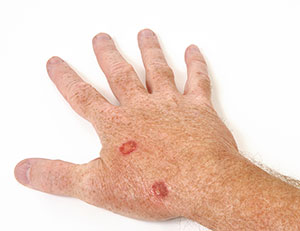 Skin cancer is the uncontrolled growth of abnormal skin cells. It occurs when unrepaired DNA damage to skin cells (most often caused by ultraviolet radiation from sunshine or tanning beds) triggers mutations, or genetic defects, that lead the skin cells to multiply rapidly and form malignant tumors.
Skin cancer is the uncontrolled growth of abnormal skin cells. It occurs when unrepaired DNA damage to skin cells (most often caused by ultraviolet radiation from sunshine or tanning beds) triggers mutations, or genetic defects, that lead the skin cells to multiply rapidly and form malignant tumors.
What You Need to Know About Skin Cancer
- Skin cancer is the most common form of cancer in the United States. More than 3.5 million skin cancers in over two million people are diagnosed annually.
- Each year there are more new cases of skin cancer than the combined incidence of cancers of the breast, prostate, lung and colon.
- One in five Americans will develop skin cancer in the course of a lifetime.
Why is seeing a dermatologist for annual skin screenings so important?
An early skin cancer diagnosis can be the difference between life and death. Early-stage skin cancers are almost always curable; those found later are harder to treat.
Will I have to undress completely? What does a full-body exam entail?
You will fully undress but wear a gown. Ask a nurse or assistant to be present if you’re uncomfortable undressing with just your doctor in the room. Sometimes my patients leave socks on, or have their hair in an up-do where I can’t access their scalp. But you can develop skin cancer anywhere you have skin—between toes, behind your ears, on your buttocks, groin, or genitalia. Women should not wear makeup or nail polish to the appointment. Wear your hair loose so that your doctor can access your scalp. Your visit should take 15 to 20 minutes. The doctor will examine each part of your skin, and may use a special magnifying glass with a light – called a dermatoscope to examine certain marks or lesions.
What questions will I be asked?
The doctor will want to know if you or any close family members have a history of skin cancer, which would increase your risk of developing the disease. You might also be asked if you’ve ever used tanning beds and how frequently, as well as how regularly you use sunscreen and other sun protection. You might be asked what medications you take, since some increase sun sensitivity and sunburn risk, or suppress the immune system, predisposing you to skin cancer. The more honest you are, the more you’ll get out of your exam.
What happens if the doctor sees something out of the ordinary? Will he/she automatically do a biopsy?
When you come for your exam, be prepared for the possibility of a biopsy that day. It’s a quick, simple procedure. We use local anesthetic and take a small tissue sample, which is then examined under a microscope. The purpose is to diagnose the condition, not treat it, so once the biopsy site heals up, if the biopsy revealed skin cancer, the remainder of the growth will be removed. If any atypical cells are found, they will be removed if deemed necessary, or the doctor might photograph them and have you come back weeks or months later to see if they have grown or changed in any way.
What can I do at home to make sure I catch skin cancers early?
We recommend that you perform a self-skin check once a month to look for any new or changing moles or marks. Have a partner help if possible: my friend’s nine-year-old daughter helped her examine her back, and discovered a basal cell carcinoma.
